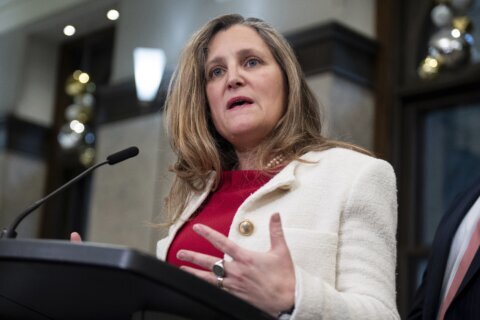ISTANBUL (AP) — Turkey’s central bank raised its key interest rate by 5 percentage points Thursday, another large but expected hike that signals a continued push toward more traditional economic policies under President Recep Tayyip Erdogan.
The bank hiked its policy rate to 30%, saying it has kept up the “monetary tightening process” to combat rampant inflation and control price instability. Its statement said inflation in July and August was “above expectations,” hitting 58.94% last month.
It takes Turkey into a more typical economic approach after critics blamed a series of rate cuts set by Erdogan for making a cost-of-living crisis worse. Turkish households were left struggling to afford rent and basic goods as inflation surged.
Erdogan has long argued that lowering interest rates helps fight inflation, a theory that runs contrary to traditional economic thinking. The Turkish central bank started cutting rates in late 2021 under pressure from Erdogan.
Central banks around the world, meanwhile, have been hiking rates to bring consumer price rises under control following the COVID-19 pandemic and Russia’s war in Ukraine. Now, banks from the U.S. Federal Reserve to Bank of England are hitting pause as they near the end of their aggressive increases.
Turkey has work to do to catch up in its fight against inflation.
After winning reelection in May, Erdogan appointed a new economic team, signaling a return to more conventional policies.
The team includes former Merrill Lynch banker Mehmet Simsek, who returned as finance minister, a post he held until 2018, and Hafize Gaye Erkan who took over as central bank governor.
Before their appointments, the central bank had cut its key interest rate from around 19% in 2021 to 8.5% earlier this year. Erdogan has fired three central bank governors who resisted pressure to cut rates before appointing Erkan’s predecessor in 2021.
Economists say Erdogan’s unorthodox policies exacerbated economic turmoil, leading to currency and cost-of-living crises that have brought hardship to households. Erdogan insists his economic model stimulates growth, exports and employment.
Following Erkan’s appointment, the bank has raised its key rate a series fo time: by an aggressive 7.5 percentage points in August, 2.5 percentage points in July and 6.5 percentage points in June.
The Turkish lira — which has lost some 30% of its value against the U.S. dollar since the start of the year — dropped slightly against the greenback Thursday.
Copyright © 2024 The Associated Press. All rights reserved. This material may not be published, broadcast, written or redistributed.






